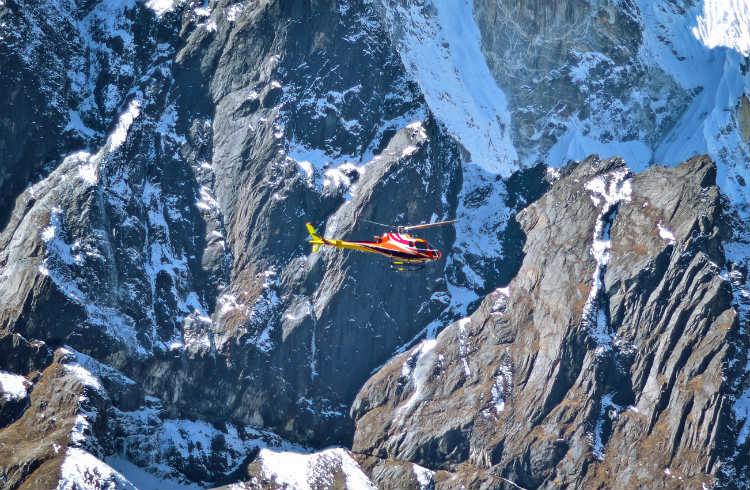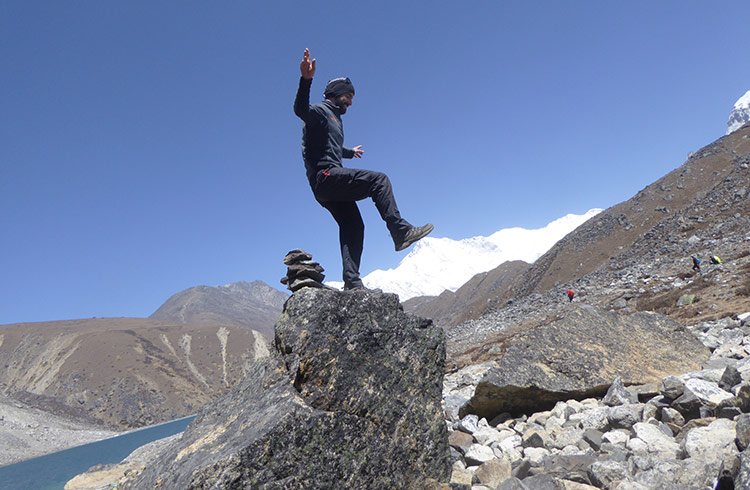The Nepal Heli-evac Scam: Everything You Need to Know
Trekkers in Nepal are warned about a travel scam involving helicopter evacuation for those suffering altitude sickness.
 Photo © iStock
Photo © iStock
UPDATE AUGUST 2018:
"A government fact-finding committee submitted a 700-page probe report to Tourism Minister Rabindra Adhikari on Monday recommending that, from the next tourist season in September-November 2018, all rescue activities be entrusted to the Nepal Police to stop the insurance scam that has damaged the country’s reputation." Read more.
Your health and safety come first
Altitude sickness, also known as Acute Mountain Sickness (AMS) can hit the most experienced trekkers, and at the first sign of symptoms, you should descend and get medical advice. Any experienced guide will tell you a helicopter evacuation is the fastest way off the mountain, but be aware you might be taken for an entirely different ride.
Scams aside: if you need to get off the mountain fast whether you’re suffering from AMS or another medical emergency, then you should put your health first.
Our Emergency Assistance Team’s priority is to help get people off the mountain to get medical assistance by the most appropriate means necessary. We have 24/7 access to a medical team who can triage symptoms and provide appropriate advice, and we have access to trusted local partners who arrange evacuations to receive appropriate medical care. As Lisa Fryar, Head of World Nomads Emergency Assistance says, “By calling us first, it also means we can pay for any medically necessary services upfront and our travelers will not be out of pocket".
The Nepal heli-vac scam
Alongside genuine medical evacuations, there are opportunistic operators who either inflate the cost of helicopter evacuations by charging single-trip prices for a full helicopter, fly hikers who may be at risk to higher altitudes to try to guarantee an insurance payment, or strong-arm unwell trekkers to take a pre-arranged helicopter by telling them they’ve already guaranteed payments with insurers when that is not the case.
Some trekkers have also reported that guides have arranged helicopters for people who may be slowing the group down, and through a network of agents and associated medical centers create documentation to guarantee payments that show AMS was suspected. In some cases, agents have harassed travelers to call their insurer from their hospital bed to relay pre-canned stories, or been forced to stay multiple nights in the hospital even when AMS symptoms may have improved with the descent.
Some guides and agents are paid a commission of 10 to 15% for arranging helicopters, and with evacuations costing around $USD6,000, this substantially boosts a local guide’s income. However, insurance fraud is not limited to local trek leaders, as some companies will supply fake documentation to justify a fast ride down for trekkers who just don’t want to walk out.
Our insurers would never place travelers at risk to negotiate a helicopter evacuation price when it’s medically necessary, and our Emergency Assistance Team consults extensively with trusted local operators and medical teams to get our travelers to safety and ensure the helicopter operator and/or medical provider is paid appropriately for their services. But we also work with those local operators in Nepal to ensure that costs are not over-inflated.
Inevitably, higher costs translate to higher insurance premiums for all travelers – whether you're heading to Nepal to hike or not. So, we work really hard to educate both travelers and our insurers on the risks and realities in Nepal, to keep insurance premiums affordable.
Why your trip of a lifetime is ruined
Aside from unnecessary costs (which will inevitably be passed on to all travelers), there's another reason to be aware of the risk of unnecessary evacuation; unless you genuinely need emergency medical treatment, your trip of a lifetime is over. You’re not going to have the great experience the rest of your party will talk about forever. When are you going to be able to find the time to come back and complete this trek? How will you ever get this group of friends together again? You’ve been ripped off not directly monetarily but in the theft of your experience!
What is altitude sickness?
AMS becomes a major risk above 8,000 ft (2,400 m) . Most people will feel short of breath as they acclimatize, however, headaches, vomiting, difficulty sleeping, diarrhea, and the onset of pulmonary edema or fluid on the lungs are serious symptoms. If you find yourself suffering from nausea, breathlessness, sleep deprivation, severe headaches, vomiting or diarrhea, you should descend to a lower altitude and seek medical advice until your symptoms improve.
Go to this Travel Safety article to read more about altitude sickness, its causes, symptoms, and treatment.
What to do if you have AMS
If you suspect you have AMS, don’t wait, descend and get medical advice. Borrow the guide’s satellite phone and call the World Nomads Emergency Assistance Team to advise them of your location and symptoms. We can provide you with support and advice, have our medical team assess your condition, and pre-authorize your evacuation and treatment work in conjunction with local doctors and operators.
If evacuation is necessary, we can help get you off the mountain quickly. But in most cases, mild AMS simply requires you to descend to a lower altitude for a short period until you recover, and then you can catch up to your party – so years later you can all stand at the bar in the pub and talk about that great adventure you had together.
Your health and safety
Our number one priority is to get people off the mountain to get emergency medical assistance by the most appropriate means necessary. We are not encouraging you to stay at altitude if you are ill. We're not expecting you to be doctors and assess your own condition (remember we do have medical staff on call 24/7 through our emergency assistance numbers and they can give you advice) and respect your decision to seek medical assistance. If you are ill, we will help you get appropriate medical care as quickly as practicable.
Nor is this about our profit, these scams have been running for many years and we've paid the bills. But as travelers, we think it's time the community acted together to stamp out this greed and profiteering. The rising costs are hurting you because of increasing premiums, and those people who have been unnecessarily evacuated from the mountain have been cheated of their travel experience. We hope that by raising awareness of the scams we, as a community of travelers, can bring pressure on the opportunistic and unethical operators to mend their ways.
Related articles
Simple and flexible travel insurance
You can buy at home or while traveling, and claim online from anywhere in the world. With 150+ adventure activities covered and 24/7 emergency assistance.
Get a quote
No Comments